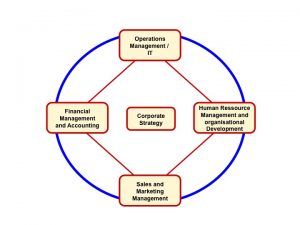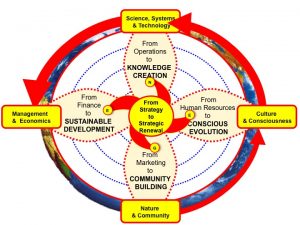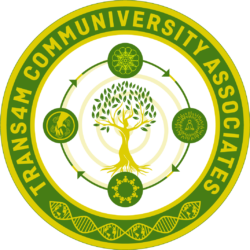- Home
- Integral Enterprise Theory
Innovation = Regenerating Knowledge | Integral Worlds Theory
Integral Enterprise Theory: Transforming the Enterprise into a Core Development Agent in Society
Prelude: The Search for a new Understanding of the Enterprise embedded in, co-evolving with and serving Society
In our own work with organisational development and transformation we have long been struggling with the question of how organisations can be designed more sustainably, and in the process become more embedded in society. Thereby, the organisation would not only be responding much more directly to the real needs of society, it would also help to evolve society and to co-evolve with it. In other words, it would strengthen at one and the same time its own sustainable organisational functioning as well as the sustainable functioning of society. Such a perception would take the organisation out of its narrow and rather artificial institutional borders, and would place it as a living, interacting and continuously adapting entity within its equally living, interacting and ever changing societal environment.
The penny started to drop when we noticed the applicability of the integral model and its three levels of self, organisation and society to the enterprise. We then engaged in intensive research, examining organisational theory and advanced sustainable practice from all over the world. We gradually came up with a new organisational design, that enabled us to represent the organisation in an integral manner and to illustrate through advanced organisational practice that indeed a number of highly sustainable enterprises operate in an integral manner. We called such organisations Integral Enterprises. The process of consciously evolving an organisation into an Integral Enterprise we called Transformation Management, to indicate that the organisational functioning would have to undergo a fundamental transformation process. As we have described this approach at length in Transformation Management: Towards the Integral Enterprise, we focus at this stage on a short introduction to the core concept, as we feel that it can strongly contribute to a transformed understanding of an organisation as an agent for the development of society.
Hurdles on the Way towards an Integral Enterprise
According to the inner logic of our integral approach, whereby the four vectors and the centre represent the core functions of any social organism, so can the major functions of an enterprise be depicted in an integral manner. This is illustrated by Figure 20.2. The integral representation takes the organisation visually out of the conventional hierarchical or matrix format. We begin to envision the organisation more as a living organism, with the coordinating force (CEO, Managing Director, President), not on top of the organisation but in its very centre. Organised around this centre are the four core functions of the enterprise: Sales and Marketing; Human Resource Management and Organisational Development; Operations Management and IT; Financial Management and Accounting.

However, what is crucial is that the functions operate in an integral and thereby transformational manner. In many of the private sector enterprises we worked with we noticed, among others, four major interconnected shortcomings that inhibit continuous transformation processes that are necessary for fast and purposeful inner development.
- Disconnected Functions: The functions of the organisation are disconnected from each other, or at least do not sufficiently build on each other. What is required is that the organisational functions would need to build on each other and mutually reinforce each other.
- North-Western Dominance: An overemphasis is given to the ‘northern’ and ‘western’ functions of the enterprise: operations and finance. As in conventional development theory and practice, we witness a privileging of the technological and financial dimension over the human and ecological dimension. In many private sector organisations we even come across a singular dominance of the financial function over the other functions. An example: If one follows organisational founding stories, we often find that at the origins of organisations like, for example, Unilever, Bodyshop, Grundig, or Avon, was a profound societal vision – an urge to respond to a societal predicament. Such organisations were deeply grounded in the societies they originated from. Many enterprises however lose this initial grounding in the course of their evolution and focus on ever more efficient operational processes (‘northern’ function) and on cash flow and return on investment (‘western’ function). Thereby the enterprise is in danger of becoming static, as the functions stop playing an equal role – interaction and continuous evolution of each of the organisational functions and thus of the organisation as a whole are inhibited. We find similar disturbing patterns in many development organisations. Though mandated to ‘serve the poor’, we see a majority of such organisations spending most of their time and resources on fundraising and project evaluation (‘West’) as well as gathering and preparing relevant statistics (‘North’). Thereby they lose touch with the communities they are supposed to serve (‘South’) and fail to understand and activate the cultural and spiritual context of their activity field (‘East’).
- Limited Functional Definition: The understanding of the organisational functions is often very narrow. In such cases the functions do not reach out and connect to individual functioning and societal functioning. An example: the ‘southern’ sales and marketing function of an enterprise is often primarily focussing on the communication and distribution of products and services providing for individual wants, rather than being in touch with the nature and community of a society, and responding consequently – through products and services – to the developmental needs in society. Another Example: In such organisations, the individual becomes a mere ‘human resource’ (what a disrespecting term for the working human being), and consequently feels alienated from the organisation – a situation which many organisations face today.
- Overall Closedness of the Organisation: All of the above shortcomings result in an internal and external closedness of the organisation, which leads to a limited flow – from within and without – of new perspectives. That diminishes the innovation potential of the organisation. An example: If we consider only the ideas and practices already introduced in Round 2 of Integral Development, we find enormous transdisciplinary stimulation for the organisation. Many organisations however don’t deal proactively with such new insights provided by other disciplines.
The Integral Enterprise seeks to overcome these shortcomings. Not only are the three levels of self, organisation and society interconnected, but, furthermore, the organisational functions are also interconnected among each other. Table.In that process, each of the original function transforms and broadens its scope.
Functional Transformation: Building the Integral Enterprise
The transformational process that each individual function has to undergo is complex. In our work we demonstrate what such transformation processes could look like. We are building on latest organisational theory and advanced practice that precedes such functional evolution – and which is well on its way, although as yet only in pockets. For example, the evolution of the function of marketing towards ‘relationship management’, ‘social marketing’ and ‘eco-marketing’, is a clear sign of a reorientation and broadening of the marketing function towards nature and community and to community building. Equally, concepts like ‘knowledge management’, ‘intellectual capital’, the ‘networked operation’ and the ‘virtual organisation’ signal a fundamental change of the northern function. Furthermore, new enterprise forms, such as social enterprise and the social business, illustrate a strong orientation towards community building and sustainable development.
So what we find are promising ‘pockets’ and ‘cases’, but not yet a fundamental redesign of the enterprise. What has not happened as yet is a redefinition and subsequently reintegration of the core organisational functions. Also, the business curricula have not all been changed towards a more integral organisational theory and practice – though what we find are lots of ‘add ons’, such as ‘corporate social responsibility’, ‘business ethics’ and ‘social business’.
With our theory on Integral Enterprise as well as in our own educational practice, we seek to promote such a transformational renewal of the enterprise functions. True to our ‘south-east-north-west’ rhythm we seek to transform the very functions of the enterprise in the following way:
- South: We reground the enterprise and its products and services in nature and community, as well as in societal developmental needs, thereby promoting ‘Community Building’.
- East: We relink the enterprise’s evolution to its own cultural and spiritual foundations and to those of its surrounding society thereby tapping into its creative resources and initiating a process of ‘Conscious Evolution’.
- North: We rebuild and design organisational structures and processes based on developmental needs and co-evolutionary processes, thereby transforming the northern function from technocratic operations to ‘Knowledge Creation’.
- West: We redefine the role of finance within the organisation as a supportive one to all other functions, and redesign it in a way that it supports the overall ‘Sustainable Development’ of the organisation and society.
- Centre: The role of the centre is an inspiring, coordinating and overall transformational one. Strategy ceases to be implemented top-down by a governance unit on top of the hierarchy, but is seen rather as a central process of ‘Strategic Renewal’, that links and stimulates interaction between the different functions of the enterprise. Leadership is understood in a lateral and serving sense and contains a strong ethical component. The ‘leader’ is one who serves others to make a transformational difference in the organisation.
For each of the five functions we propose a transformational process, based on our GENE process.
In the following we provide an overview on the Integral Enterprise, its transformed functions and the transformational GENE-spiral in its centre.

We maintain that any reconfiguration of the enterprise would need to come with an inbuilt transformation process, enabling each enterprise to continuously evolve its own theoretical base and organisational practice.
Note: In recent years, there has been a growing interest in the Integral Enterprise. We have been working with Deutsche Telekom on an integral enterprise design (see download below), and, to provide few additional examples, are actively supporting the UK bank Virgin Money , Egypt’s Sekem Group, Jordan’s MedLabs Group and Nigeria’s Paxherbals Group on their way of becoming an Integral Enterprise
Note: This summary builds on Lessem, R. & Schieffer, A. (2010). Transformation Management: Towards the Integral Enterprise
Downloads:
An Application of Integral Enterprise to Deutsche Telekom


Leave a Comment